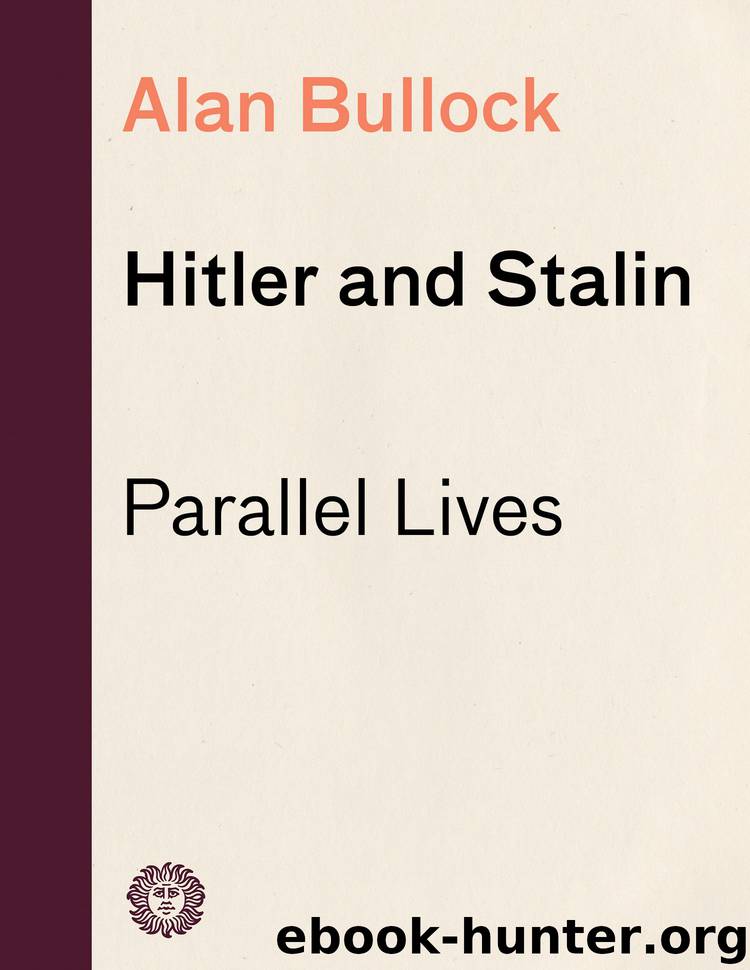Hitler and Stalin by Alan Bullock

Author:Alan Bullock
Language: eng
Format: epub
Publisher: Knopf Doubleday Publishing Group
Published: 2019-12-10T16:00:00+00:00
* * *
—
THE MORE Hitler learned of the French and British governments’ attitudes, the more he became convinced that, while they would undoubtedly protest, he ran very little risk of their opposing him if he were now to take a bolder line. Even before the Saar plebiscite, he told a meeting of ministers: “The French have definitely missed the opportunity for a preventive war. This also explains France’s effort for rapprochement.”2 The German strategy in the face of British and French approaches was reconfirmed in January 1935; there might be negotiations, but there would be no agreement in any way limiting German rearmament or committing Germany to a comprehensive settlement. Negotiations would simply be used to cover the time during which Germany rearmed. The real question for Hitler was whether he should not go further and take the initiative himself.
A 90 percent vote in the Saar for reunion with Germany was hailed by the Nazis as the first of the Versailles fetters to be struck off. Hitler now followed it with the unilateral abolition of a much more important prohibition imposed on a defeated Germany. On March 9, 1935, Berlin announced that a German air force was already in existence, and then a week later—after a pause to see what reaction this aroused—that the German government proposed to reintroduce conscription and create a peacetime army of thirty-six divisions, with a strength of 550,000 men.
Timed to coincide with Heroes’ Memorial Day the same weekend, this repudiation of the hated Versailles Treaty and the rebirth of the German army was greeted with an outburst of patriotic enthusiasm. That could be taken for granted: But how would the British and French react? The British issued a solemn protest—and then asked if Hitler was still willing to receive the British foreign minister, Sir John Simon. The French appealed to the League and called a conference of the signatories of the Locarno Pact—Britain, Italy, and France—at Stresa but spoke of searching for means of conciliation and the need to dispel tension. This was not the language of men who intended to back up their protests with action.
When the British foreign secretary, accompanied by Anthony Eden, arrived in Berlin—in itself a triumph for Hitler’s diplomacy—they were politely received but found Hitler adamant that he would never sign a pact of mutual assistance that included the Soviet Union, a skillful use of the anti-Communist card to avoid the main issue. Germany, he declared, was rendering a great service by rearming in order to protect Europe against the Communist menace.
In April, the three Locarno signatories duly met at Stresa, condemned Germany’s action, reaffirmed their commitment to the Locarno Treaty, and repeated their support for Austrian independence. They followed this by a meeting of the League Council (on which the USSR now had a seat), which in turn appointed a committee to consider what steps should be taken the next time any state endangered peace by repudiating its obligations. Finally, as all that was left of Barthou’s Grand
Download
This site does not store any files on its server. We only index and link to content provided by other sites. Please contact the content providers to delete copyright contents if any and email us, we'll remove relevant links or contents immediately.
| Anarchism | Communism & Socialism |
| Conservatism & Liberalism | Democracy |
| Fascism | Libertarianism |
| Nationalism | Radicalism |
| Utopian |
The Secret History by Donna Tartt(16723)
The Social Justice Warrior Handbook by Lisa De Pasquale(11506)
Thirteen Reasons Why by Jay Asher(7833)
This Is How You Lose Her by Junot Diaz(5829)
Weapons of Math Destruction by Cathy O'Neil(5080)
Zero to One by Peter Thiel(4867)
The Myth of the Strong Leader by Archie Brown(4809)
Promise Me, Dad by Joe Biden(4478)
Beartown by Fredrik Backman(4465)
How Democracies Die by Steven Levitsky & Daniel Ziblatt(4448)
Stone's Rules by Roger Stone(4438)
The Fire Next Time by James Baldwin(4373)
100 Deadly Skills by Clint Emerson(4108)
A Higher Loyalty: Truth, Lies, and Leadership by James Comey(4059)
Rise and Kill First by Ronen Bergman(4045)
The David Icke Guide to the Global Conspiracy (and how to end it) by David Icke(3913)
The Farm by Tom Rob Smith(3895)
Secrecy World by Jake Bernstein(3808)
The Doomsday Machine by Daniel Ellsberg(3758)
